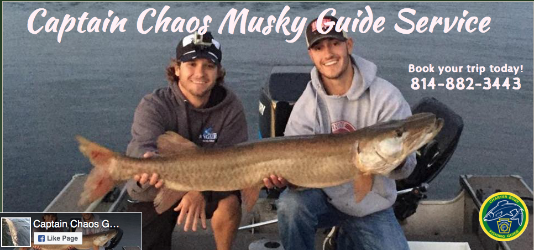IMPORTANT MESSAGE: Meeting Minutes, Club Chit-Chat, and Fishing Reports will be listed if you are a member of Chapter 50. If you are a member, and you cannot see the reports after logging in, please use the contact form by selecting the floating envelope icon located in the bottom-right corner. Include your name and your Chapter 50 membership number. We will verify, and grant you special rights to view all. Alternatively, you may email us at muskiesincpennjersey @ gmail .
3:37 pm
Moderators
February 19, 2004
 Offline
OfflineMighty Muskies of the Susquehanna: A Fantastic yet Fragile Resource
Herb Bloxsum's 49" hawg from the
West Branch of the Susquehanna River.
Tom Dietz, the Hard Lines Manager of the Williamsport Gander Mountain located in Pennsdale, is extremely passionate about musky fishing. He grew up in Wisconsin, and got hooked on fishing for the mighty Muskellunge some fifteen years ago. He has fished Wisconsin, Minnesota, Michigan, New York, West Virginia, Ontario, Canada and most recently Pennsylvania in pursuit of the King of Freshwater. Since moving to Muncy last April, Dietz is very impressed with the local musky fishery, most notably the Susquehanna River. He has fished both branches of the river, and likes them both equally as well. "These two branches are different, in regards to fish locations and water clarity, but they both harbor excellent quantities of muskellunge", Dietz says. "The two river branches contain both excellent quantity and quality of muskies, and the variety of fishing structure is outstanding".
The muskellunge, or musky, is the official State Fish of Wisconsin. There are hundreds of lakes across the Badger state that harbor good populations of muskies, and this is where Dietz learned to fish for them and hone his musky angling skills. He was a professional fishing guide in the famous Eagle River area of Wisconsin, and fished a number of musky tournaments over the years, including the Professional Musky Tournament Trail prior to working for Gander Mountain. During this time, Dietz also ran a major musky lure manufacturing company called Joe Bucher Tackle Company for seven years. While with that company, he worked closely with one of the most famous of all musky anglers, Joe Bucher. "I was already a dedicated musky fisherman when Joe hired me to run his tackle company, but Joe brought my knowledge and tactics of pursuing this great game fish to a whole new level". Dietz was also a regular guest host on the television show "Fishing With Joe Bucher" which airs on the Outdoor Channel and he has had several feature articles published in Musky Hunter Magazine, the largest publication dedicated to the pursuit of musky fishing.
Prior to moving to the Williamsport area, Dietz had heard rumors about big muskies in the river after doing some online homework and reading a few local fishing reports. Dietz then met a new friend from Unityville, Herb Bloxsom, last May at Gander Mountain. "Herb and I were talking one day in the fishing department of the store, and I told him I was an avid musky fisherman. He said he was too, and our friendship was instantly born. He told me he would contact me in early July, since that is when he typically does well on the Susquehanna. On our first outing on the river together, I caught a forty-two inch fish and a thirty-four inch musky within about ten minutes. I also had a very large musky follow my jerk bait right to the boat. I could see immediately that the Susquehanna River was a special place." Also in early July, Dietz caught and released three muskies in one morning on top water lures, including his largest Pennsylvania musky ever, a robust forty-eight inch fish that weighed a little over thirty pounds. Dietz and Bloxsum, who also works at Gander Mountain in their fishing department, fish avidly together on their days off. Between them, they have boated a good number of muskies together this year on the river. Herb caught his largest musky ever fishing the Susquehanna in October. She was forty-nine inches long and had an incredible twenty-four inch girth! They have fished other area musky waters together, such as Cowanesque Lake, Hills Creek Lake, Rose Valley Lake, and Lake Chautauqua in New York. "Our other area lakes like Cowanesque and Rose Valley have some nice muskies present, but do not have anywhere near the numbers of fish the Susquehanna holds", Dietz says.
Dietz also met another fanatic musky fisherman named Ed Powell, from Lairdsville, PA. Ed is a frequent customer at Gander Mountain, and is very passionate about musky fishing and bass fishing. Ed was gracious enough to introduce Tom to the North Branch of the Susquehanna River recently, and on their very first outing together, they caught and released three nice muskies together up to forty-two and one half inches in a span of four hours.
Tom Dietz poses with a North Branch 41 incher prior to release.
When musky fishing the Susquehanna River, Dietz recommends using bucktail spinners and noisy top water lures in the summer months for casting, and using crank baits for trolling. In the late summer period through late fall, he switches to jerk baits and crank baits for casting, as well as crank baits for trolling applications. In the winter months when water temperatures dip below forty degrees, slow moving jerk baits or jig/reaper combinations work best since the very cold water temperatures slow down the muskie's metabolism and make them less aggressive. "I use quality wire leaders on all of my lures", Dietz adds. He also strongly recommends sharpening your hooks properly prior to hitting the water. "When you purchase any brand new musky lure, the hooks are never sharp enough out of the package. Get a flat file hook sharpener, and carefully sharpen each hook so with little pressure, they stick in your thumbnail. Then you know your hooks are ready for battle." He also recommends using a high quality musky net to minimize stress to the big fish while being unhooked, and to properly handle a fish that might exceed forty inches in size. "The inexpensive smaller landing nets really split and damage the fins on muskies and remove much of their protective slime layer during the netting process. I use a larger musky net, in particular the Power Catch Big Game Series made by Frabill, because the special treated net bag doesn't split the tail fins or remove the slime layer, and the hooks do not get tangled up in the rubber coated net bag." Dietz says the larger nets make landing a trophy musky a sure thing rather than a "let's hope we can get her in there" proposition.
Once the fish has been landed, he strongly encourages catch and release on all of the muskies. "If you want to mount one of these magnificent fish, you can get excellent graphite reproductions that look identical to the real thing. All you need is the length and girth measurements prior to the release of the musky, plus a good color picture, and the taxidermists have everything they need. I am getting a reproduction of the forty-eight inch fish I caught with a twenty-three inch girth this past July. It was so exciting easing her back into the water to grow some more, and know that I have the chance to now let her exceed the magical fifty inch benchmark for trophy muskellunge in the future."
"A typical 32 inch musky is around five years old", Dietz says. "As the muskies grow in size, especially when they exceed forty inches, their growth rates slow down dramatically. A fish that is in the upper forty inch range or fifty inches long is at least a fifteen year old fish, sometimes even twenty years old". Many local area anglers keep muskies either to eat, or because they are avid bass fishermen, and are afraid that the muskies are eating all of their bass. Dietz points out the falseness of this common belief. "Like my friend Herb says, Muskies will eat no more bass than a bass will eat of themselves."
"Herb is exactly right, because muskies prefer to eat suckers and small carp, and they will eat the occasional walleye, but they prefer soft-rayed forage fish like suckers. The healthy population of suckers in the Susquehanna is responsible for the nice girth and healthy condition of the muskies in the river." Dietz also points out the importance of catch and release. "Muskies may be big, but they are very fragile and because they are the top predator i
n the food chain, they live in comparatively low numbers. Because there is no regular stocking program occurring on the river, it is imperative that anglers release these fish to allow them to grow to trophy size." He also recommends carrying a good camera to take a few snap shots prior to releasing the fish back to the river.
Dietz knows of at least nine muskies killed in a small stretch of the Susquehanna River he fishes regularly this summer alone, with most of these fish not even exceeding forty inches. Muskies less than forty inches haven't even reached maturity yet. "Those kind of harvest rates are very alarming, especially coming from Wisconsin, where over ninety percent of all muskies caught are released each year", he said. "If you want a better tasting fish to eat, keep the walleyes or panfish rather than the muskies." Dietz says he doesn't want to come across like a purist at all, but stresses that the special local population of muskies here in the Susquehanna could easily be threatened by over harvest, since they are not stocked on any kind of regular basis.
For more information on musky fishing and the importance of practicing proper catch and release methods, Dietz recommends logging on to http://www.MI50.com since they are the closest chapter of Muskies Inc. in the east central Pennsylvania area. Muskies Inc. is dedicated to educating anglers through the sharing of information, and education of proper fish handling procedures and release methods. Dietz also has his own fishing web site at http://www.tomdietz.com. His personal web site has an up to date local fishing report board and numerous articles on musky fishing to educate anglers who visit the site. He can also be reached via an email link on his web site or by stopping into Gander Mountain. Tom will always be willing to talk about muskies or musky fishing!
CATCH PHOTO RELEASE
12:47 am
June 23, 2004
 Offline
OfflineThat's exactly right, it'll be in next months magazine. You read it here first, though!
Seriously, I got it from Tom's website, which has about a dozen articles that any one of us could learn something from.
Capt. Dieter Scheel http://www.BigDRiverGuide.com
18
1 Guest(s)
 Log In
Log In Register
Register





